|
October 19, 2017
Public
Sector Workers Affirm Their Right to Decide
Nova Scotia Workers Continue
Resistance to Liberal
Government's Attacks
- Kevin Corkill -
PDF

Nova Scotia public sector workers gather outside Liberal Party AGM,
Halifax, October 14,
2017.
Public
Sector
Workers
Affirm
Their
Right
to Decide
• Nova Scotia Workers
Continue Resistance to Liberal Government's
Attacks - Kevin Corkill
• All Out to
Stand With Ontario College Faculty! -
David
Starbuck
Opposition to Federal
Anti-Worker Regulations
• Defence Organizations of Unemployed Workers
and Unions Demand Abolition of Arbitrary Appeals Tribunal -
Pierre Chénier
• "We Are Demanding Deep Changes to the
Employment Insurance Appeal Process" - Interview: Sylvain
Bergeron, Coordinator of Actions and Services Working in Unity with the
Unemployed, Saguenay-Lac-Saint-Jean, Quebec
Justice for
Injured Workers!
• Compensation Is a Right! - Peggy
Morton
• Response to Alberta Workers' Compensation
Board
Review
Panel Recommendations
Public Sector Workers Affirm Their Right
to Decide
Nova Scotia Workers Continue Resistance
to Liberal Government's Attacks
- Kevin Corkill -

Around one hundred workers from across Nova Scotia came
together on
October 14, to continue their resistance to the attacks on their
rights
by the McNeil provincial Liberals. From as
far
away as Sydney, a five-and-a-half hour drive, workers converged at
a Halifax park across from where the Nova Scotia Liberal Party was
holding its Annual General Meeting (AGM). With the passing of
Bill 148,
the
Public
Services
Sustainability (2015) Act and Bill 75, the
Teachers' Professional Agreement and
Classroom Improvements (2017) Act,
the
McNeil
Liberals
have
made
it
clear they are intent on
dictating the working conditions and terms of employment of more
than 75,000 public sector workers in Nova Scotia. Public sector
workers
have responded with a resounding "No! We want a say and are determined
to have a say on those
affairs that affect our lives and the important work we do!"
The Liberal AGM was a pathetic affair with less
attendance than there were demonstrators in opposition. Reports reveal
they did not discuss any of the difficulties facing the people much
less offer solutions. They appeared content to engage in
self-congratulatory celebrations on their "victory" in the May 30
provincial election. This so-called victory, which the Liberals declare
gives them a mandate to attack the working class and engage in
anti-social nation-wrecking, was hollow indeed. Such elections split
the working class between factions which serve the ruling class. They
do not allow the working people to have a unified agenda to solve
problems and have their peers become the government. On this basis, the
Liberals claim to have "won" a majority of seats with only 21 per cent
of eligible voters voting for them and with just 53.88 per cent of the
polity casting a vote for any of the candidates. The low participation
rate in elections has become routine and exposes the representative
democracy as a sham and actual dictatorship of the rich over the
working people. The need has never been greater for methods of
governing where the working people decide the agenda and choose their
peers as rulers so that they can be held to account.
The workers who gathered in the park expressed their
determination to affirm their right to decide their working conditions
and terms of employment and show the McNeil Liberals that these attacks
on their rights will not pass. The Liberals have failed to resolve any
problems facing Nova Scotians and lash out at public sector workers
when what is needed is a pro-social alternative that stops paying the
rich, increases investments in social programs and public services and
defends the rights of all.
The rally was followed by informal discussion on what
actions could be organized to further involve public sector workers and
Nova Scotians in defending their rights. Workers are affirming their
right to decide their working conditions and terms of employment and in
doing so fight for a new pro-social direction for the economy and the
rights of all!

All Out to Stand With Ontario College Faculty!
- David Starbuck -

Picket line at Cambrian College, Sudbury, October 18,
2017.
For the fourth time in 50 years, Ontario community
college faculty members have found it necessary to take job action to
obtain working conditions satisfactory to them, and which enable
faculty to provide the quality education and training that today's
students require.
The struggle of the college faculty is just. The fight
for their rights is a fight for the rights of all. The longstanding
demand is for stability and job security for part-time and contract
staff and the need to have college decision-making follow academic
criteria. These demands favour the students as well as college workers
themselves. The fight
is for a modern education system that defends the rights of all.
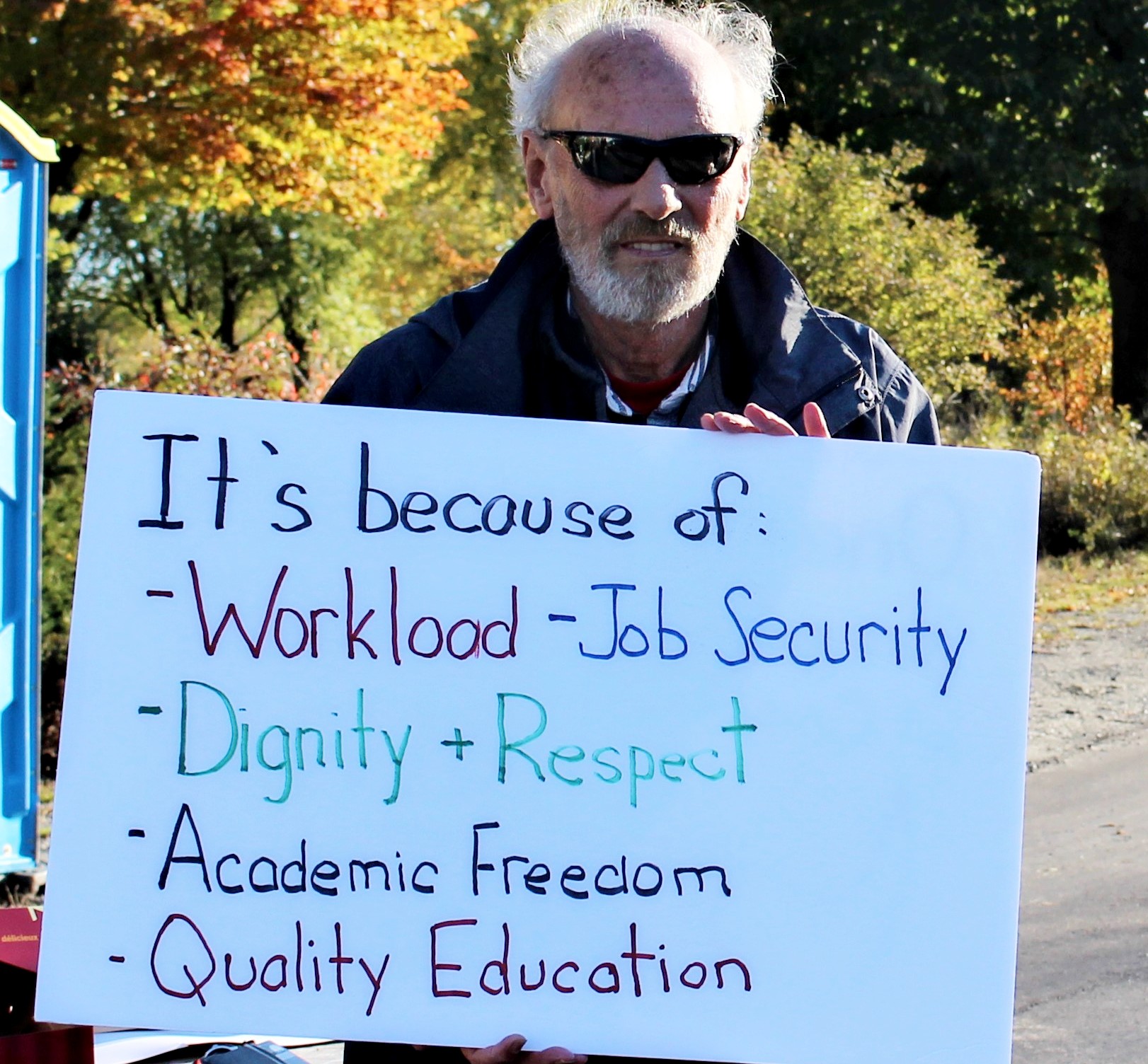 The strikes in the Ontario
college system have mostly centred on workload, job security, academic
freedom, quality education, dignity and respect. In essence, they have
been about who decides and in what manner. The strikes in the Ontario
college system have mostly centred on workload, job security, academic
freedom, quality education, dignity and respect. In essence, they have
been about who decides and in what manner.
The four-week strike in 1984 was about workload.
Faculty demanded and won a formula that measured the work of each
faculty member in classroom teaching, preparation, evaluation, routine
administrative tasks and other assigned duties. The workload formula
established a limit of 44 hours per week and a maximum of 36
weeks of teaching with the balance of the academic year assigned to
course and professional development. College administrators have never
reconciled themselves to implementing the spirit of the workload
formula but have instead found myriad ways to subvert its intent.
The response of college management to the workload
formula was to increase the number of contract faculty (part-time,
partial-load and sessional), increase class size, reduce the hours of
instruction of community college courses, increasingly replace human
teachers with technology, and privatize many ancillary college
operations.
When the college system was instituted fifty years ago,
it was designed to be based primarily on full-time permanent faculty.
Sessional faculty worked thirteen or more hours a week, a system
designed for medium-term replacement of faculty who were away for
medical reasons, maternity, sabbaticals, etc. The colleges agreed to
replace a
sessional employee with a permanent employee if the work existed for
more than a year. Part-time faculty taught six or fewer hours per week.
This enabled the colleges to bring in specialists such as dentists in
the dental hygiene programs.
No provision was made for those who taught between
seven and twelve hours per week. The government's Colleges Collective Bargaining Act banned
part-time
and
sessional
employees
from
joining
a
union.
The increasing number of faculty hired for seven to twelve
hours per week became known as partial-load employees. Since they
were not specifically proscribed in legislation from joining a union
they won that right in court in the early eighties. This left the
present mishmash of employment conditions for faculty, and encouraged
college management increasingly to hire contract employees with no or
limited rights as opposed to permanent employees with certain rights.

Sir Sanford Fleming College, Peterborough.
Crisis in the Economy Reflected in the Colleges
College programs were originally designed to resemble
the workplace not the university. Programs ran for 35 hours
per week and most work was expected to be done in class with only very
limited work to be done at home. Over the years, classroom hours have
been reduced. Few programs have more than 25 hours per week
of instruction and often less than 20. In addition, the length of
the semester has been decreased in most programs.
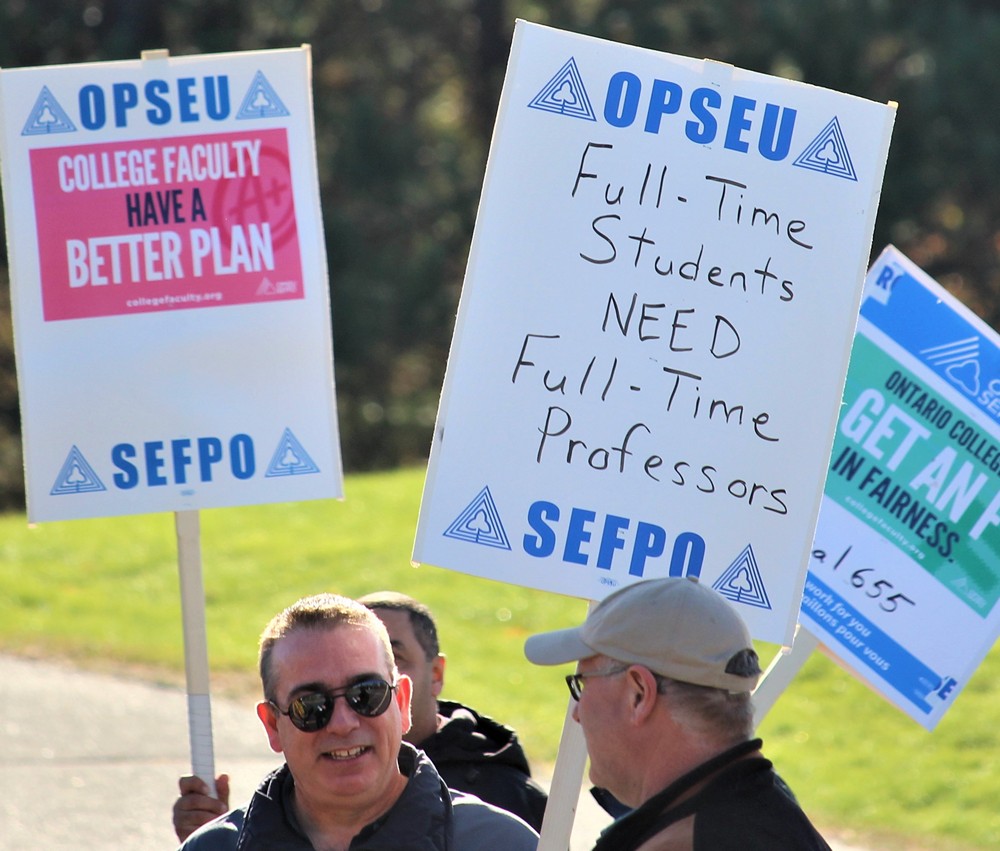 Despite the rhetoric of the
colleges about student
success, students have increasingly been left to fend for themselves
and pursue their studies by independent means. Despite the rhetoric of the
colleges about student
success, students have increasingly been left to fend for themselves
and pursue their studies by independent means.
In all key features, Ontario electoral political
parties of left, right and centre have pursued and supported this
program of attrition in response to the deepening of the economic
crisis.
Ontario governments of various stripes have funded
students and the community college system at the lowest rate of all
provinces. Their solution to the intensifying economic crisis has been
to shift the burden of the crisis onto the backs of students and
college employees and to keep faculty and support staff out of any
significant role in
college decision-making. The Liberal government has even learned to
dispose of contract negotiations before the scheduled election so that
they do not overshadow the campaign.
The Government of Premier Kathleen
Wynne Is Responsible
for the Current Situation

Algonquin College, Pembroke.
Society needs community college graduates as skilled
workers to meet the demand of the modern economy. Whereas universities
have some independence in decision-making by virtue of their charters,
community colleges are creatures of the Ontario government and subject
to its whim. The Ontario government uses college education to pay the
rich in various ways by providing trained employees while those who
employ them do not pay for the value they receive. Also, through
various privatization schemes, public monies for college services are
routed through the hands of the monopolies and the rich.
|

Click to enlarge.
|
The Ontario government has permitted, and even demanded
through underfunding, that the colleges use faculty on a precarious
basis. The Liberal government of Dalton McGuinty engineered the farce
of 2008, whereby contract college employees were given the right
to vote to unionize days before the election was called. After the
election, the McGuinty government colluded with the College Employers'
Council to prevent the counting of the votes and block the right to
unionize.
The human necessities of college employees, especially
those of contract employees, are given no consideration. No thought is
allowed as to how the Ontario community college system, its employees
and
students, can serve a nation-building project to advance Canadian
society in the twenty-first century on a new historical basis.
College management is pursuing a vision of the Ontario
college system in which a relatively small number of permanent
employees act essentially as administrators and managers of a large
number of insecure, low-paid contract employees with no rights who are
treated essentially as widgets to be employed or not employed as meets
the needs
of the colleges. College administration does not see the role of the
human factor in college education; they have a predilection for
industrial methods. They are opposed to any sort of collegial
decision-making in which faculty participate with an independent voice.
College Workers Demand an End to Nation-Wrecking

Seneca College, Toronto
The situation is coming to a head. College management
seems determined to force a showdown. In this, it must have the support
of the Wynne Liberal government. College management shows no
willingness to negotiate a principled settlement. It promotes the idea
that the union proposals will reduce jobs of contract employees instead
of
turning contract employees into full-time employees. It rejects the
modern view that putting value into hiring new full-time faculty lifts
up the entire college education system adding enormous value to the
economy and society. Instead, the College Employers' Council seems
determined to vilify faculty and demonize them in the public eye as a
cost, not a valuable asset adding essential value to a modern society.
The Council's propaganda smells of ulterior motives to take value out
of the college system and put it elsewhere. At the very least, it does
not show any inclination on the part of college management to find a
principled settlement with faculty.
The Right to Decide Those Affairs that Affect the
People
This October, sessional and part-time faculty have been
engaged in a union certification vote. For 50 years, contract
college employees have been prevented from exercising their right of
association through the terms of the Colleges
Collective
Bargaining
Act and the legal trickery of "labour relation experts" such
as the Hicks Morley law firm. Successful unionization of
college contract
employees will shift the balance of power towards college employees and
students and give them a greater voice in the direction of the college
system and the important decisions that directly affect their lives.
The College Employers' Council wishes to force a new contract on
full-time faculty on terms acceptable only to college management and
limit faculty's freedom of action before union certification of college
contract employees is complete.
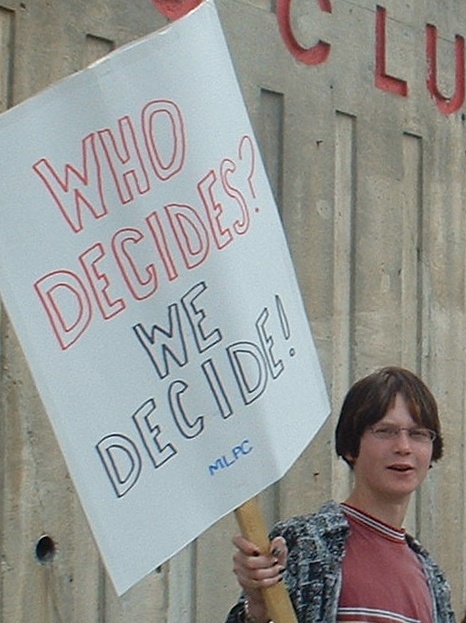 College management seems
determined to subject all college decision-making to their whim. In
opposition, faculty members want to uphold their professional judgement
and academic freedom, which includes the integrity of their courses and
their content. The need is now to rally behind the strike mandate, for
all faculty members to stand
firmly for a college system that serves themselves as educators and
meets the needs of students. The need is now for workers from all
sectors of the economy to be very active in supporting the just demands
of the college faculty. Support for this strike is a stand for rights
and against Liberal rhetoric that attempts to cover over the difficult
reality
facing the working people and ends up doing nothing to solve the
problems facing the people, economy and society. College management seems
determined to subject all college decision-making to their whim. In
opposition, faculty members want to uphold their professional judgement
and academic freedom, which includes the integrity of their courses and
their content. The need is now to rally behind the strike mandate, for
all faculty members to stand
firmly for a college system that serves themselves as educators and
meets the needs of students. The need is now for workers from all
sectors of the economy to be very active in supporting the just demands
of the college faculty. Support for this strike is a stand for rights
and against Liberal rhetoric that attempts to cover over the difficult
reality
facing the working people and ends up doing nothing to solve the
problems facing the people, economy and society.
The main issues in this strike are Who Decides
and how decisions are made, job security and decent working conditions
for contract employees. In the final analysis, college management and
the Ontario government want a college system where decisions of any
significance are made by management in the interests of the monopolies,
where faculty, support staff and students are mere pawns of the rich
and powerful. This cannot be allowed to pass! Modern society demands
that all workers, including contract college employees have the right
to job security and to wages and working conditions acceptable to
themselves. Modern society demands the participation of all in making
the decisions that affect their lives!
All Out to Support Ontario College
Faculty Members in
Their Struggle
for Job Security and the Right to Decide!

Confederation College, Thunder Bay

St. Clair College, Windsor

Mohawk College, Hamilton

Humber College, Etobicoke
 
George Brown College, Toronto; Durham College, Oshawa

Georgian College, Barrie

Cambrian College, Sudbury

Algonquin College, Ottawa
David Starbuck is a
retired Ontario community college teacher and the federal
Marxist-Leninist Party candidate in Sudbury. He taught technical
mathematics at Cambrian College in Sudbury for over 32 years. For
many years, David served as a steward and communication officer for the
faculty union, OPSEU Local 655. In his later years, the Cambrian
faculty members elected him to
defend their interests as the sole faculty representative on the
Cambrian College Board of Governors.

Opposition to Federal Anti-Worker
Regulations
Defence Organizations of Unemployed Workers
and Unions Demand Abolition of
Arbitrary Appeals Tribunal
- Pierre Chénier -
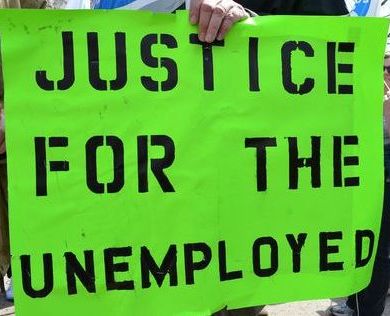 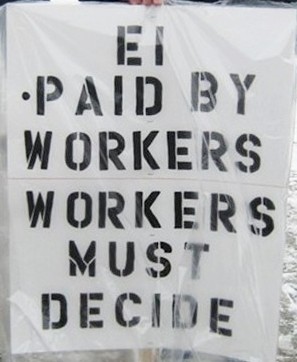
Thirty-two groups, mostly defence organizations of
unemployed workers and unions, sent an open letter on August 30 to
the federal government demanding deep changes to the Employment
Insurance appeal process. The main target of their letter is the Social
Security Tribunal. The Harper government instituted the arbitrary
tribunal
as part of the anti-social reform of the Employment Insurance regime
in 2012-13.
The new appeal process of the Social Security Tribunal
has caused havoc in the lives of unemployed workers and EI recipients.
In the face of opposition to the tribunal across the country, in March
the Trudeau government hired the global accounting giant KPMG to review
and consult on the tribunal's performance. In early September KPMG
reported to the Minister of Families, Children and Social Development
on its findings and recommendations. The report has not yet been made
public.
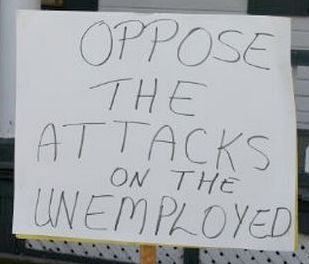
Under the hoax of streamlining various appeal processes
and "saving money for the taxpayers," the Harper government created the
Social Security Tribunal as the body to hear appeals from applicants
for Employment Insurance, Old Age Security and the Canada Pension Plan.
The tribunal replaced the EI Board of Referees/Umpire appeal
process, instituting in its place a two-step appeal process with a
General Division and an Appeal Division. The roughly 800 people
working for the EI Board of Referees/Umpire appeal process were
replaced by about 100 people appointed by the government.
The former Board of Referees was a multi-regional
tripartite structure, with one representative from employers, one from
working class organizations and a chairperson. The regional members of
the Board of Referees were from the region where the worker lived and
filed an appeal with all hearings required to have the worker present.
Under the new system, a single member of the tribunal
hears the appeal. That person does not have to be from the region and
is not required to conduct a hearing with the worker present. Most of
the hearings are conducted by video conference or over the phone, even
from the home of the member of the tribunal.
Abolish the Tribunal!
The signatories of the letter demand replacement of the
Social Security Tribunal. They pinpoint many devastating aspects of the
current process. They estimate that the time required for decisions
both at the first instance at the level of the General Division and at
the second Appeal Division level has quadrupled to an average of four
months.
In the case of the Appeal Division, the time may extend to a full year
and more. Needless to say, the unemployed workers are forced to find a
way to sustain themselves without EI benefits while this process slowly
proceeds, which is entirely unjust.
Access to any aspect of the appeal process is by no
means automatic. At the level of the General Division, the member of
the tribunal has "summary dismissal" power, which means the application
to appeal can be dismissed without even hearing the worker.
At the Appeal Division, the worker must ask for
authorization to appeal and the case may be dismissed without any
further hearing.
Since the establishment of the arbitrary tribunal, the
number of EI appeals has dropped dramatically. Under the previous
regime, 24,000 requests a year to the first level of the Board of
Referees were accepted.
Before accessing the new appeal tribunal, any worker
challenging an unfavourable EI decision must file a request for
reconsideration. Workers file approximately 58,000 requests for
reconsideration per year of which 30,000 are summarily dismissed. Of
the 28,000 allowed to appeal, only 3,500 workers a year continue the
process.
The appeal process is also highly secretive. Workers
often do not receive a copy of their file until late in the process. If
they are not represented by a defence organization, life is a
bureaucratic journey into an unknown abyss. The defence organizations
of the unemployed have coined the expression that the new appeal
process is a "no right, no
benefits process."
Rights of the Unemployed Must Be Recognized and Upheld!
The casualties of the process and indeed of the entire
EI regime are the rights of the unemployed and the facts surrounding
the reality of being unemployed and without a livelihood in a
socialized economy controlled almost entirely by big companies. The EI
regime and appeal process do not recognize the right of unemployed
workers to
compensation at a Canadian standard. The current economic system has
never been able to provide steady employment and a livelihood to the
workers because that is not its aim. In fact, unemployment is lauded by
those in control of the economy as necessary for its proper
functioning. Unemployment ensures there are always workers whose
capacity to work is available for purchase by those who own and control
the socialized economy. Unemployment also puts downward pressure on the
price of workers' capacity to work. Without full employment for all as
an aim of the economy, redress and compensation must be provided to the
unemployed as a right.
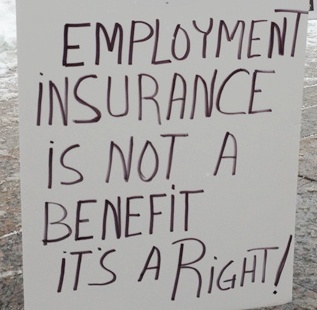 The EI regime dismisses the
facts of life of the economic system in the most arbitrary absurd way.
The EI regime is based on assumptions of levels of unemployment in
definite regions. These assumptions are recognition that unemployment
is a constant in the lives of workers. However, these assumptions do
not lead the EI regime to provide
full compensation to the unemployed as a right but are used arbitrarily
as determinants of EI eligibility. This turning of facts and truth on
their head permeates the entire anti-social anti-worker EI system,
including the appeal process. The EI regime dismisses the
facts of life of the economic system in the most arbitrary absurd way.
The EI regime is based on assumptions of levels of unemployment in
definite regions. These assumptions are recognition that unemployment
is a constant in the lives of workers. However, these assumptions do
not lead the EI regime to provide
full compensation to the unemployed as a right but are used arbitrarily
as determinants of EI eligibility. This turning of facts and truth on
their head permeates the entire anti-social anti-worker EI system,
including the appeal process.
Even though the actual conditions in a region are
supposed to be used as a determinant in EI claims, under the new regime
a member of the tribunal may arbitrate appeals from regions with which
they have no connection at all and no knowledge of the concrete
conditions that workers there face.
Activists tell Workers' Forum that they are
brushed off when they bring forward facts of the conditions of life,
even those relating to how workers are paid. (See interview below.)
These facts are necessary within the rules to determine the EI amount
unemployed workers are entitled to or to determine if a decision
forcing repayment
of benefits because of overpayment was made in error, etc. Workers
themselves and their representative are being eliminated from the
process, with no hearing occurring at which the unemployed are present
and able to present their case face to face with another human being
who might listen to them. What remains is entrenched executive power,
the arbitrary police power of the state, which criminalizes and
marginalizes the unemployed and renders account for these actions to no
one.
The signatories of the letter make it clear that they
do not want the result of the review to be minor tinkering with the EI
regime. They demand real changes favorable to the workers and
their rights. Among other things, they demand the reinstatement of the
three-member panels that existed with the Board of Referees, the
removal of the
"summary dismissal" power, and the requirement to seek leave to appeal.
They demand full information be provided on each and every case to
workers and their representatives right from the beginning of the
process. They also demand that workers be entitled to a hearing in the
format of their choice -- in person, by video or telephone.

"We Are Demanding Deep Changes to the
Employment Insurance Appeal Process"
- Interview, Sylvain Bergeron,
Coordinator of Actions and Services Working
in Unity with the
Unemployed, Saguenay-Lac-Saint-Jean, Quebec (LASTUSE) -

Workers demonstrate in Saguenay, February 23, 2013, against Harper
government's EI reforms.
(D. Canuel)
Workers' Forum:
LASTUSE, as a member of the
Autonomous Movement in Solidarity with the Unemployed (MASSE), supports
the call for a complete overhaul of the EI appeal process. Can you
describe what LASTUSE has experienced with this appeal process and what
changes you demand?
Sylvain Bergeron: In
the appeal process at this
time, we have access to only one person, who is appointed by the
government. Gone is the Board of Referees, which was made up of three
people, one representative of the employer, one representative of
labour, and a chairperson appointed by the government. They were all
from the
region and knew the reality on the ground. Now we are dealing with one
person, who does not even have to come from our region.
A general problem facing the new system is the
difficulty of having the facts examined in the appeal process. I
believe that in remote regions we live this reality a little harsher
than other places. For example, we often have forestry workers going
through the appeal process. Since we no longer deal with a Board of
Referees, who were local
people, people from the field, the new member of the Social Security
Tribunal does not know the region and certainly the peculiarities of
the forestry industry. When we start dealing with how payrolls work in
logging, for example, and payrolls play a big part in applications and
appeals in the employment insurance system, they are completely
lost. They have no idea of what we are talking about. These are people
who were simply appointed by the government as judges. Among them are
former Progressive Conservative candidates or donors to the party.
Another example is that the judge of the Appeal
Division does not accept that the facts must be examined. At that
level, he is only considering arguments on points of law. The judge
considers the decision that has been taken by the lower level of appeal
strictly based on whether it is good from the point of view of the law.
It was different
before with the umpire. The decision was also made on the basis of the
law but the judge agreed to examine the facts and took the time to
examine the facts of the case.
Another important issue is the hearings. Hearings
should be conducted in person, as was the case before. This forms part
of the credibility of the case. The hearings are largely an issue of
credibility, the word of the worker versus the word of the employer.
But since the introduction of the new system, only one or two per cent
of my files are
heard in person. The hearings today are done by video conference or
even
the telephone. Without even seeing in person the reactions of the
judge, my EI recipients often ask me, "Do you think the judge listened
to us?" This lack of seeing the adjudicator in person puts additional
stress on them.
Knowing the regional particularities, the concrete
reality, is very important. To act as referee, it takes people who know
the reality. That knowledge makes a huge difference in the decisions.
When I appeared before the Board of Referees I had a success rate of
approximately 93 per cent. Now, at the level of the General
Division of the
Social Security Tribunal the success rate has fallen to about 70
per cent. We are now more often forced to go to the next level in the
appeal process since this new tribunal system has been in place.
Another problem is the delays, which have become
extremely long. Before, at the Board of Referees, the process could not
exceed 45 days to settle a file. Now at the General Division it
takes months and even longer at the next stage, which can drag on for a
year or even longer.
Meanwhile, the stress on the unemployed is very
intense. People have to live somehow while these things drag on. In
addition, there is the fear that sets in around the process, something
which has existed for a long time, well before the Harper reform. Many
unemployed people no longer want to apply for EI because they are
afraid. They say
that if they are to be treated as fraudsters, then they will no longer
apply. They may be eligible but they do not apply. They empty their
RRSPs. They face increasing hardships just to make ends meet.
The situation for the unemployed is extremely difficult
in regions where the economy is worse off, such as in the
Gaspésie, Côte-Nord, Abitibi or Saguenay-Lac-Saint-Jean.
Finding a job is very difficult there. The pressure on unemployed
workers is stronger. We demand deep changes to the Employment Insurance
appeal process.

Justice for Injured Workers
Compensation Is a Right!
- Peggy Morton -
The Report and Recommendations of the Alberta Workers'
Compensation Board (WCB) Review Panel were released in early July.
Submissions on the report were accepted by the Alberta government until
September 30. The government will now review the recommendations
and responses, prior to introducing new legislation.
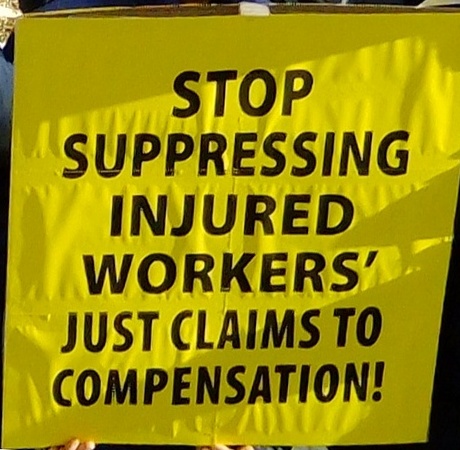 Many injured workers
participated in the review, together with unions and advocates. Injured
workers spoke out on the terrible impact of the violation of their
rights by a WCB obsessed, not with caring for injured workers, but
reducing employer premiums. They conveyed the important message that
the wrongs inflicted on injured workers in
violation of their rights must be acknowledged and redressed. Many injured workers
participated in the review, together with unions and advocates. Injured
workers spoke out on the terrible impact of the violation of their
rights by a WCB obsessed, not with caring for injured workers, but
reducing employer premiums. They conveyed the important message that
the wrongs inflicted on injured workers in
violation of their rights must be acknowledged and redressed.
Particularly over the last 15 years, the WCB has
been focused on finding ways to deny benefits to workers. Those schemes
include outright rejection of claims by dismissing the opinion of
treating physicians and health professionals, deeming workers able to
perform non-existent jobs at inflated wages, declaring that workers
have a
"pre-existing condition" and other ways. In addition, no one has
tabulated or exposed how many employers have coerced injured employees
into not filing a WCB claim so that employers could benefit from
"incentive schemes" to reduce premiums.
The Review Panel began its work in early 2016.
Many injured workers actively took part in the review. Seventy workers
from different sectors of the economy participated in meetings between
the panel and injured workers in Edmonton, Calgary and Lethbridge.
Injured workers, individual unions, the Alberta Federation of Labour
and
other advocates completed questionnaires, gave written submissions, met
with the panel and took part in "engagement sessions."
In its report, the Panel acknowledged that the WCB is
seen to have a "culture of denial." Workers spoke out demanding the WCB
and other authorities treat injured workers with respect and dignity.
They affirmed their right to maintenance of their standard of living,
to retraining when needed, to accommodation at the workplace, and to
have
all their medical and health needs met. They smashed the silence on the
poverty and pain in which so many injured workers are forced to live
and the brutal treatment rained down on them by the WCB.
The Final Report of the Panel included 60
recommendations addressing some of the major concerns put forward by
workers and their collectives. They include:
- Establish a Fair Practices Office operating
independently from the WCB, to provide increased assistance to injured
workers including an alternate disputes resolution process. The Appeals
Commission and Medical Panel Office would operate independently of the
WCB.
- End all incentive programs for case managers and
health care providers to send workers back to work or be declared ready
to return to work. Remove all arbitrary limits to treatment (such as
the secret "six week rule" for physiotherapy).
- Selection by workers of health care providers such as
physiotherapists; independent medical examiners to be chosen by the
worker from a roster established in conjunction with the College of
Physicians and Surgeons of Alberta, not by the WCB; ending the practice
of using WCB paid and retained "medical consultants" to provide second
opinions on workers they have neither seen nor treated for the purpose
of overriding the opinion of the treating physician.
- End the practice of returning "surplus" premiums to
employers. For example in 2015, the "surplus" returned to
employers was equal to 40 per cent of all premiums paid, with
employers paying the lowest premiums in Canada even before the
"surplus" was returned.
- Require employers to continue coverage under existing
health benefits programs.
- Provide interim relief for workers who have
demonstrated they have an arguable case while their matters are under
appeal.
- Make changes to the deeming process to eliminate the
most fraudulent aspects.
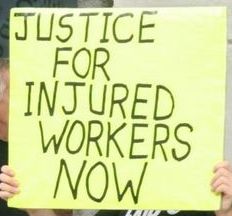 The Canadian Injured Workers
Association of Alberta called for further reform of the deeming
process. It states, "The recommendations of the panel address the
fraudulent deeming practices of the WCB, in particular the way in which
WCB declares workers capable of working full-time at a phantom job such
as a parking lot attendant or store
greeter, irrespective of the workers' skills, experience, education and
physical limitations, and the existence and availability of such work.
To add insult to injury, WCB then increases the imaginary wage for this
phantom job every year until workers are left with a pittance or often
no benefits at all. The Canadian Injured Workers
Association of Alberta called for further reform of the deeming
process. It states, "The recommendations of the panel address the
fraudulent deeming practices of the WCB, in particular the way in which
WCB declares workers capable of working full-time at a phantom job such
as a parking lot attendant or store
greeter, irrespective of the workers' skills, experience, education and
physical limitations, and the existence and availability of such work.
To add insult to injury, WCB then increases the imaginary wage for this
phantom job every year until workers are left with a pittance or often
no benefits at all.
"The recommendations are a good beginning, but in order
to protect the rights of injured workers, deeming must be used only
when documented evidence exists that a worker has refused a legitimate
job offer for appropriate work. The job must be available and suitable
for the worker's skills, education and experience. The WCB must support
injured workers in their efforts to obtain real work. The reluctance of
employers to hire injured workers must be recognized, and compensation
continued until workers have found suitable work. A 'deemed' wage must
not only be based on verifiable information as proposed by the panel
but established annually, not years into the future. All
workers now deemed should be able to have their case re-opened
including access to appeal."
Read the full 192 page report of the Workers'
Compensation Board (WCB) Review here.

Response to Alberta Workers' Compensation Board
Review Panel Recommendations

Group photo, members of the Canadian Injured Workers Association of
Alberta.
The Canadian Injured Workers Association of Alberta
(CIWAA) recently issued its response to the report and recommendations
of the Workers' Compensation Board (WCB) Review Panel established by
the Alberta government. CIWAA congratulated all the injured workers,
their allies and advocates who have worked to smash the silence
on the fate of injured workers. CIWAA stated it was "pleased to see
that the recommendations of the review panel have addressed some issues
of great importance to injured workers."
However, the CIWAA identifies five important issues not
considered by the panel, and calls on the government to implement the
changes outlined below. It also calls for an ongoing consultative role
for injured workers through their organizations as part of a new Fair
Practices Office. In addition it calls for further measures to restrict
deeming,
which should only be used when documented proof exists that a worker
has refused suitable work.
"1. Justice for Injured Workers now without benefits
and often living in extreme poverty. The report details many ways in
which workers are unjustly denied benefits, but makes no
recommendations for reparations and to address the ongoing injustices.
"The panel recognized that the review and appeal
process is daunting for injured workers, especially those who do not
have a union at their workplace or collective to support them. Injured
workers living in poverty may have abandoned their claim, missed a
deadline, or failed to assemble the evidence they needed to counter the
'medical
opinions' of WCB-retained 'paper doctors' who never saw or treated them.
"Recognition of the failure of the current WCB system
to uphold the rights of injured workers requires that injured workers
whose claims have been unjustly denied have access to review and
appeal. All denied claims of injured workers where the decision was
based on the opinion of WCB paid physicians, medical consultants and
medical
panels which contradicted the clinical observation and findings,
ongoing direct examinations and supporting medical evidence of treating
physicians and/ or health care providers must be reopened on request.
As well, if the worker now has evidence or medical opinion which was
not previously presented at the time of adjudication, this evidence
should be considered and not rejected on strict legal grounds, e.g.
time limits or lack of 'new evidence.'
"2. Claim suppression: Employers must not be permitted
to engage in claim suppression with impunity and strong penalties
against employers should be in place. All systems which encourage
employers to suppress claims must be ended.
"3. Non-economic loss payments [NELP] should reflect
the real impact of a disability on a worker's life outside the
workplace. Current payments show how little value is placed on the life
of a worker. To provide some examples of how profound changes to a
worker's life are valued: a worker who becomes legally blind in both
eyes would be
eligible for a NELP of $28,800; complete immobility of a knee
-- $22,500; hearing loss -- from $360-$4,500 (and
no, $360 is not a typo) and infertility -- $4,500. The
maximum for a worker who is totally disabled (e.g. paralysis of at
least two limbs, profound brain injury, loss of both hands) is
about $90,000.
"4. Medical Panels. The decision of a Medical Panel is
considered final and not subject to any form of appeal. This is a
denial of natural justice. For example, new information could show that
the Medical Panel erred. Therefore decisions rendered by Medical Panels
should be subject to appeal.
"5. Pre-existing conditions: The WCB declares that
normal aging constitutes a 'pre-existing condition' -- a blatant form
of
age discrimination. Even when a worker has not previously been
diagnosed or treated by a physician for this 'condition,' and was able
to perform their job before the injury but can no longer do so, WCB
declares a 'pre-existing condition.' WCB then limits benefits to a
period of
recovery from an 'exacerbation of the pre-existing condition.' WCB
should recognize a pre-existing disability or impairment, not a
pre-existing condition."
The CIWAA calls on injured workers and their allies to
continue to go all out on the basis that Workers' Compensation Is a
Right, to ensure that the positive recommendations of the panel and the
important issues not included in the panel's report be addressed in new
legislation and WCB policy.

PREVIOUS
ISSUES | HOME
Website: www.cpcml.ca
Email: office@cpcml.ca
|




















 The EI regime dismisses the
facts of life of the economic system in the most arbitrary absurd way.
The EI regime is based on assumptions of levels of unemployment in
definite regions. These assumptions are recognition that unemployment
is a constant in the lives of workers. However, these assumptions do
not lead the EI regime to provide
full compensation to the unemployed as a right but are used arbitrarily
as determinants of EI eligibility. This turning of facts and truth on
their head permeates the entire anti-social anti-worker EI system,
including the appeal process.
The EI regime dismisses the
facts of life of the economic system in the most arbitrary absurd way.
The EI regime is based on assumptions of levels of unemployment in
definite regions. These assumptions are recognition that unemployment
is a constant in the lives of workers. However, these assumptions do
not lead the EI regime to provide
full compensation to the unemployed as a right but are used arbitrarily
as determinants of EI eligibility. This turning of facts and truth on
their head permeates the entire anti-social anti-worker EI system,
including the appeal process.
 The Canadian Injured Workers
Association of Alberta called for further reform of the deeming
process. It states, "The recommendations of the panel address the
fraudulent deeming practices of the WCB, in particular the way in which
WCB declares workers capable of working full-time at a phantom job such
as a parking lot attendant or store
greeter, irrespective of the workers' skills, experience, education and
physical limitations, and the existence and availability of such work.
To add insult to injury, WCB then increases the imaginary wage for this
phantom job every year until workers are left with a pittance or often
no benefits at all.
The Canadian Injured Workers
Association of Alberta called for further reform of the deeming
process. It states, "The recommendations of the panel address the
fraudulent deeming practices of the WCB, in particular the way in which
WCB declares workers capable of working full-time at a phantom job such
as a parking lot attendant or store
greeter, irrespective of the workers' skills, experience, education and
physical limitations, and the existence and availability of such work.
To add insult to injury, WCB then increases the imaginary wage for this
phantom job every year until workers are left with a pittance or often
no benefits at all.